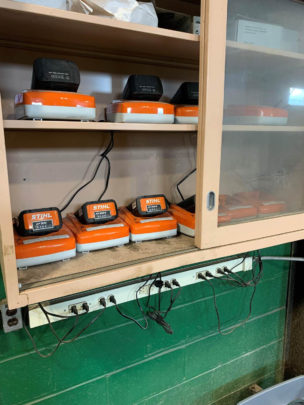As old tools need replacement, Horticulture and Grounds opts for zero-emission, battery-operated equipment. Since the pilot project in July 2019, the department has added thirteen new products, adding to the total of twenty-one battery-operated pieces of equipment that are used on the University campuses and properties.

Here is a cohesive list of equipment Horticulture and Grounds has invested in:
- 2 push mowers
- 1 Mean Green
- 2 chainsaws
- 1 extension chainsaw
- 5 handheld blowers
- 4 hedge shears
- 2 extension hedge shears
- 2 line trimmers
- 3 units with attachments to Sheer/Edge/Prune
The video clip shown below of staff utilizing the new equipment demonstrate a few of the benefits of switching from traditional equipment to the new battery-operated ones. The new equipment is not as loud as gasoline-fueled equipment, which allows employees to work near highly populated areas such as the Medical Center and dormitories without creating a disturbance. In fact, the noise is quiet enough that there is no need for ear protection, allowing employees to work more comfortably. The battery-operated tools are significantly lighter than gas-powered ones, making them easy to start and transport, reducing the chance of injuries. Moreover, the absence of gasoline is beneficial to the environment and the health of the University’s employees.
Horticulture and Grounds was recently recognized as a Sustainability Superstar for consistently progressing the University towards a more sustainable institution while maintaining campus beauty. Thanks to manager John McIntyre, supervisor Bill Keenan, and the entire department, the University has been named a Tree Campus USA for 11 consecutive years. Additionally, the department has converted two campus areas into walking trails, which reduces the need for lawn mowing. Annually, this saves 210 hours in labor, 346 gallons of fuel, and $1,040 (based on the cost of fuel at $3/gallon), all while reducing greenhouse gas emissions. The department also composts leaves collected on campus, with the resulting compost ready for reuse within two years. Currently, the department is testing Avenger Organic Weed Killer to replace synthetic weed killer. The University community has responded positively to the department’s sustainability efforts and will hopefully continue to do so as more improvements are made.
Written by Emily Su, Class of 2022
Photo Credits: John Mclytyre, Manager of University Horticulture & Grounds
[Shown in video clip: Larry Steele (on mower) and Jason Miner (on line trimmer)]

